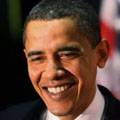Obama wins Nobel Peace Prize amid questions
 Washington - Just a week ago, US President Barack Obama's international stature was being questioned after his last-minute intense lobbying failed to bring the 2016 Olympics to his hometown of Chicago. Then he won the Nobel Peace Prize.
Washington - Just a week ago, US President Barack Obama's international stature was being questioned after his last-minute intense lobbying failed to bring the 2016 Olympics to his hometown of Chicago. Then he won the Nobel Peace Prize.
Only in the ninth month of his presidency, Obama has captured one of the world's most coveted awards, but the decision has left some asking, as the Wall Street Journal did, "for what?"
Even Obama acknowledged the criticism in brief remarks accepting the award, saying he did not feel he deserved to be in the company of past recipients.
"Let me be clear, I do not view it as a recognition of my own accomplishments, but rather as an affirmation of American leadership on behalf of aspirations held by people in all nations," Obama said.
The Norwegian Nobel Committee made the stunning announcement on Friday that Obama was its latest peace laureate, emphasizing his desire to change the tone of international diplomacy. Obama becomes the third sitting US president to win the award - after Theodore Roosevelt and Woodrow Wilson - and the first in 90 years.
Obama has set lofty goals for his first four years in office, but has achieved no major foreign accomplishments. Little progress has been made in the Middle East peace process. His desire to close the Guantanamo Bay prison by a January 22 deadline is in doubt. US troops are still in Iraq, and at the moment Obama is deliberating whether to escalate the war in Afghanistan.
But at the same time, he is following through on campaign promises to reach out to traditional US foes. He has made overtures to Cuba, and for the first time in decades the United States held its highest level talks with Iran.
Last month Obama appeared before the United Nations to highlight the need to build international relationships. He also moved quickly into negotations with the Russians to reduce nuclear stockpiles - discussions eased by his decision to drop controversial plans to base a missile-defence system in Eastern Europe. Obama gave a speech in June in Cairo to appeal to the Muslim world.
These were all pledges Obama made on the campaign trail, before the February 1 cutoff for the Nobel committee's nominations, a deadline that came less than two weeks after he moved into the White House.
Obama still enjoys solid popularity ratings abroad and at home, even though the numbers have dipped domestically in large part because of the debate over health care reform. Obama also took criticism over his decision to fly to Copenhagen October 2 to push Chicago's unsuccessful Olympic bid at a time when the US economy is still mired in hard times.
With a full list of deep challenges facing Obama, some had wondered whether the president was losing his luster, and the decision by the Nobel Committee caught even Obama off guard.
"It's safe to say he was very surprised," White House spokesman Robert Gibbs said.
The announcement in Oslo by the Nobel Committee drew gasps of surprise with reporters in attendance and left the five-member panel explaining how it unanimously decided to hand the award to someone with no major policy accomplishments.
The committee appointed by the Norwegian parliament is no stranger to controversy. Its chairman, Thorbjorn Jagland, emphasized the decision was based on what Obama had promoted in the past and was not a reflection of whatever decisions he makes in the future.
Jagland cited the efforts of other Nobel Peace recipients based on what they sought regardless of the outcome.
"If you look at the history of the Nobel Prize, we have tried to enhance what many personalities have tried to do," Jagland said. dpa